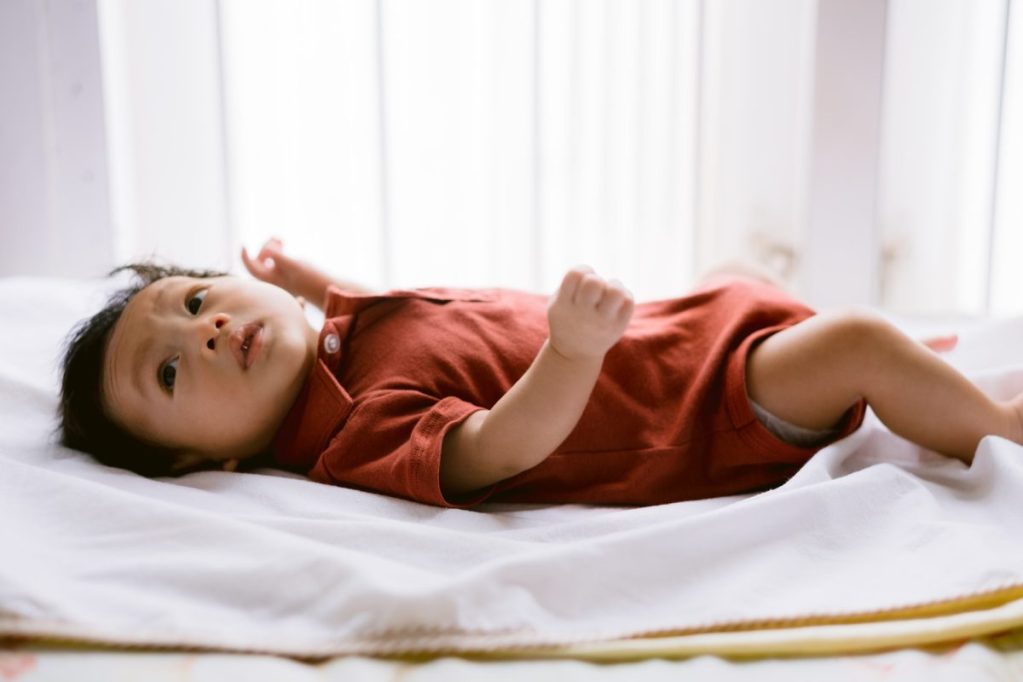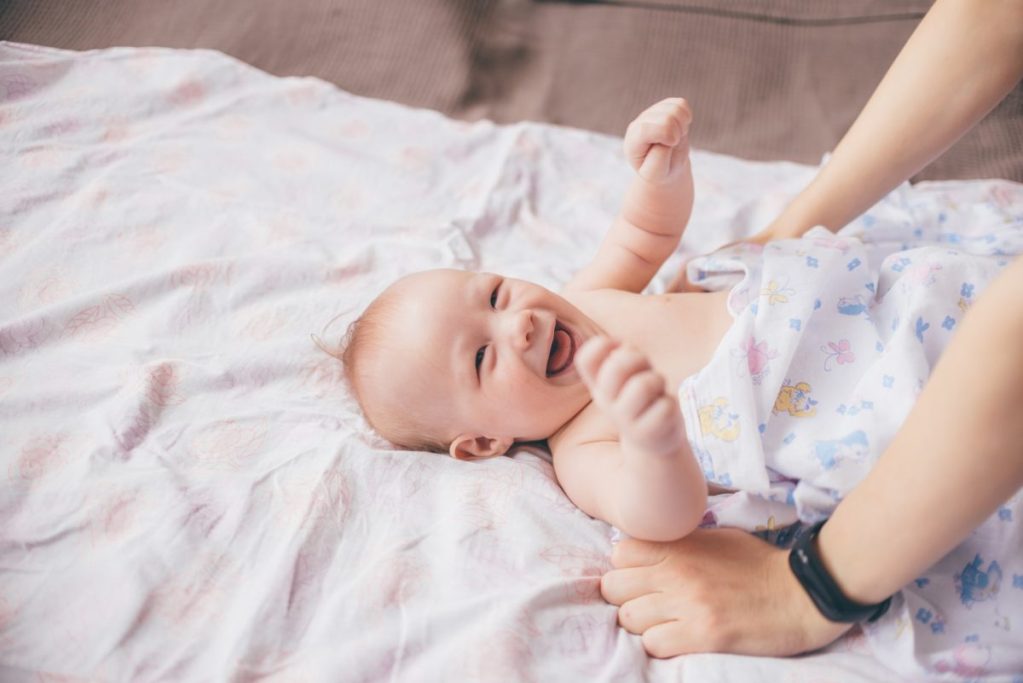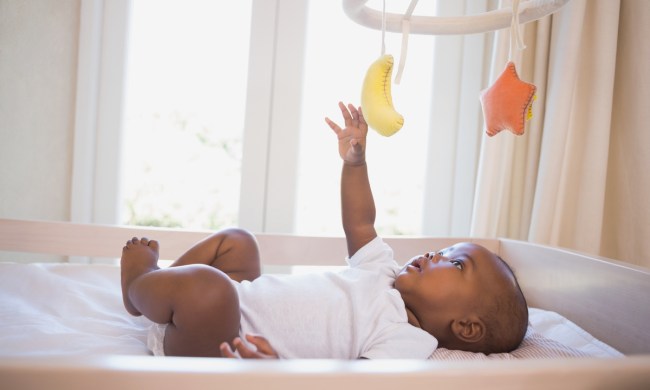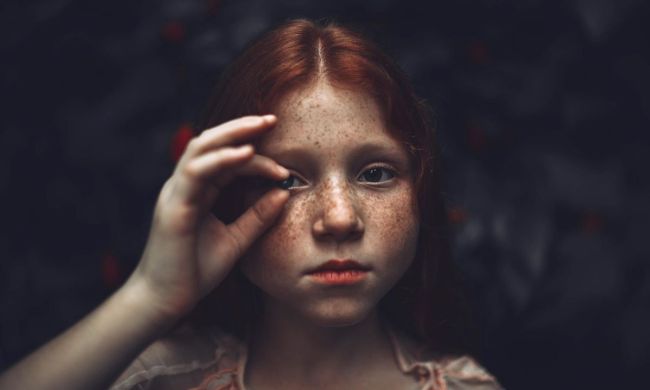As hard as parents try to keep their babies safe from dangers around the home, they’re only human, and sometimes accidents happen. A fall only takes a split second to happen with little ones. If you’ve ever put your baby down on a bed and turned your back for even a quick second only to see your baby fell off the bed during those moments, you know this is true. Babies falling off beds is the leading cause of injuries for children. You happen to have your baby lying there — away from the edge, no less. You turn around for just a few seconds and then you hear your baby crying.
What do you do? First, you’ll need to keep from panicking. Taking a deep breath and making some initial observations is a vital step to ensure your baby gets the right help. Once you’ve calmed down imagining your little one going over the edge, we have advice for you to follow in case this unfortunate accident happens to your child.
What to do to avoid further injury

Remain calm and assess the situation
The first step challenges any parent’s natural instinct to want to pick up their child. However, according to the Cleveland Clinic, one of the most important pieces of advice for what to do if baby falls off the bed is to not pick them up. In fact, moving your child could make things worse if they sustained a head or neck injury as a result of the fall. Unless your child is at risk for further injury, you should not move them.
But if your baby falls off the bed and immediately goes into a seizure or starts vomiting, gently roll the child onto their side to avoid choking, making sure the neck stays completely straight. If the fall resulted in an open wound, then you should apply gentle pressure and check for any bruising.
Calling in backup

When to call 911
If your baby becomes unconscious, you should call 911 right away. If your baby struggles to stay awake or appears limp after the fall, call 911.
Aside from the loss of consciousness and vomiting, according to Healthline, you should call 911 if you see any of the following symptoms, as any of these signs indicate a fracture or a serious internal injury.
- Bleeding out of the nose and ears
- Swelling of the soft spot
- Any other bruising or swelling on the head or around the eyes or ears
- Sensitive to noise (even white noise) and light
- Dilated pupils or one pupil being bigger than the other
- Inability to stay awake regardless of the time of day
When to call the doctor
As for the bleeding, bruising, or a bump on the head, call the doctor to find out what to do next in administering first aid.
In fact, anytime a fall occurs, especially for a young infant, you should call your doctor no matter what. They may ask you to bring your baby into the office that very same day or go to the emergency room, regardless of the appearance and/or seriousness of the injuries. In this situation, it’s better to play it safe.
Along with the check-up, the doctor will advise you on how to control your baby’s pain level and recommend an over-the-counter medication like the infant formula of acetaminophen or ibuprofen.
Keep a close watch on your tot for a bit

As far as what to do after your baby fell off the bed but sustained no serious injuries, you’ll need to keep a close watch on their behavior and other symptoms. After such an incident, babies tend to get rather sleepy and will want to rest more than usual. Your doctor might advise you to wake your baby up periodically to check for signs of a concussion and to make sure their condition is not getting worse.
When waking your baby, you’ll need to check for:
- If they awaken easily
- If they recognize you
- If breathing is normal
If you see these signs, then all should be well within a few days. However, if you notice something out of the ordinary or one or more of these signs are not occurring, then call 911 or your family doctor immediately.
How long should you monitor them?

Parents can become anxious after their baby falls and feel relief when their child seems to be fine, but it’s important to monitor your baby for at least 24 hours after any fall. In many instances, the baby will be completely fine, but many experts advise you to check your baby every hour for the first four hours after a fall, and then at four-hour intervals after that, for 24 hours just to make sure.
Check for visible bumps, swelling, or bleeding, and watch to see if their movement is normal or if they seem to be in any discomfort. Also, note if they’re feeding normally or if their appetite has changed. If anything seems out of the ordinary reach out to your pediatrician.
It’s more common than you think

It can be easy to feel guilty as a parent if your child suffers a fall, but as we mentioned before, it is somewhat of a common occurrence. A recent study found that 22% of babies under the age of 6 months experienced a fall from a bed or similar item of furniture and lists accidental falls as “the most common causes of injury among infants.”
In fact, pediatrician Laura O’Connor, MD explained to The Cleveland Clinic that “even babies who don’t know how to purposefully roll yet can spontaneously, reflexively, roll over when you least expect it.” Because of this, it’s all the more important to take necessary precautions with infants of any age to prevent any accidental falls.
How to prevent falls in the first place

People without children might tell you to stop putting the baby on the bed, then they won’t fall off. We know that if a bed is where a baby is quiet and happy, a bed is where the baby stays. But there are precautions you should take to make sure a roll doesn’t equal a fall.
Helpful guidelines
- No unsupervised time on the bed
- Keep the bed clear of extra blankets and sheets
- One hand on the baby at all times
- If you leave, the baby leaves with you
Babies are ninjas. Two seconds to cross the room is more than enough time for a baby to roll right off the bed. The first step in what to do if your baby falls off the bed is to prevent it from happening. Eyes and a hand on that baby at all times if they are on a bed. This goes for any surfaces, including spots like the changing table or the couch.
You don’t want extra sheets and blankets on the bed as the baby could get tangled. If you leave the room for any reason — we know that coffee needs a reheat — take your baby with you. Whether you have a full roller or not, a baby is capable of taking a tumble.
You take all the safety measures to ensure your baby’s well-being, but there are times when accidents do happen. Staying calm and collected is the first step in what to do if your baby falls off the bed. Another crucial fact to remember is that if you decide to call emergency medical services, the doctor, or decide to go to the ER, no one will fault you for taking an abundance of caution. It’s always better to make sure your baby is okay.




